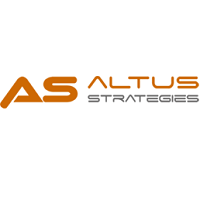Altus Strategies PLC (LON:ALS) Chief Executive Officer Steven Poulton caught up with DirectorsTalk for an exclusive interview to discuss their bauxite deal with Canyon Resources.
Q1: Altus Strategies is a so-called ‘project generator’, you’re listed on AIM and you’re also listed on TSX-V and you now have 18 projects in Africa. Yesterday, you announced a deal on your bauxite project in Cameroon, can you tell us more about the project?
A1: We first staked this asset that we’ve got a deal on in Cameroon in 2010, we identified that the geology in this region was particularly attractive for bauxite. Bauxite is the ore mineral for aluminium and obviously aluminium is used as a very energy-efficient metal, lightweight metal, and that’s very important in today’s world.
We spent about $130,000 doing some exploration and we defined some drill targets from that work and then in 2013, we signed a deal with Canyon Resources who are listed on the Australian Stock Exchange. The deal was that they would spend about AU$6 million to earn an 75% interest in that project and as part of that transaction we received AU$150,000 in cash which effectively paid back our exploration expenditure. They also provided us with 8 million shares in Canyon and they have a current value of about £850,000 or AU$1.6 million and one of our directors David Netherway, who’s our Chairman, also joined the Canyon board in an oversight role. So, I guess you could describe us as a fairly classic joint venture transaction we undertook with them.
Canyon then undertook some drilling on the project and they defined a number of very high grade and low impurity bauxite plateau and these bauxite plateau’s are very close to surface, in fact from surface in many cases. They were around about any between 6/7 to 13 or 20 metres deep and the mining of them will be relatively straightforward.
Very recently, this year, Canyon secured the license for a project called Minim Martap which is adjacent to our Birsok project and it really is by all definitions a world-class asset. It has a current JORC resource of over 0.5 billion tonnes at a grade of around about 45% Al2O3 and relatively to low silica of just 2% and we believe also very low impurities.
Most critically of all of this, these two projects Birsok and Minim Martap are located about 10 kilometres from a rail line that is in use and that runs to the sea port in Cameroon at Douala. So, it’s a very well-located project and we are very pleased to have done this deal yesterday.
Q2: So, the transaction sounds very attractive, can you tell us about the terms of the deal?
A2: What we’ve done is agreed to wind up the joint venture and transfer the Birsok and Mandoum licenses to Canyon. The consideration for doing this is 25 million shares for winding up the joint venture and we’ll get 15 million shares on signing and 10 million 12 months after signing and as I mentioned at the beginning, Canyon shares currently have a value of around 10/11p per share, they trade on the Australian Stock Market.
On transferring the licenses across, we’ll get another 5 million shares once the Birsok project has a mining convention signed on it. In addition to this, and perhaps most importantly as part of the deal, we’ll receive a US$1.5 million per tonne royalty on all that is mined and sold from the Birsok project. This royalty is effectively going to generate perpetual income stream for our shareholders and could potentially be very valuable indeed.
The total holding that we’ll then have in Canyon, if you count the existing 8 million shares that we have right now from when we first struck the joint venture, will be 38 million shares with a valuation of just over £3.9 million or £4 million, right now C$6.5 million. Our current market capitalisation on AIM and the TSX-V is only £6.6 million, or C$11 million, and we would make a case that the Birsok project is perhaps non-core across our portfolio and as such, this deal perhaps of everything illustrates that we genuinely are trading at a below some of our parts valuation.
Q3: How does this deal with Canyon fit in with Altus Strategies broader strategy and should we expect more deals?
A3: It joins exactly with our strategy, we have a fairly straightforward business model which is discover projects attract partners to finance those projects and the exploration development of those projects and for us to monetise our interest in those projects, retaining a royalty. I guess this deal that we’ve done with Canyon ticks all of those boxes.
Effectively, we’re seeking to undertake transactions on all of our projects, we’re very dispassionate about that and very open and upfront that our business model is to have lots of projects to do deals on all of them as far as they’re able to, in other words as far as they show economic opportunities for joint venture partners.
Over time, we want to continue to grow our portfolio of discoveries and the cash and income that you will see from doing our transactions is used to finance our exploration business. This means our shareholders have fantastic exposure to a large or substantial portfolio which is diversified by geography, by commodity and by stage of development. It also has less of the funding risks that are traditionally associated with the exploration sector more broadly.




































